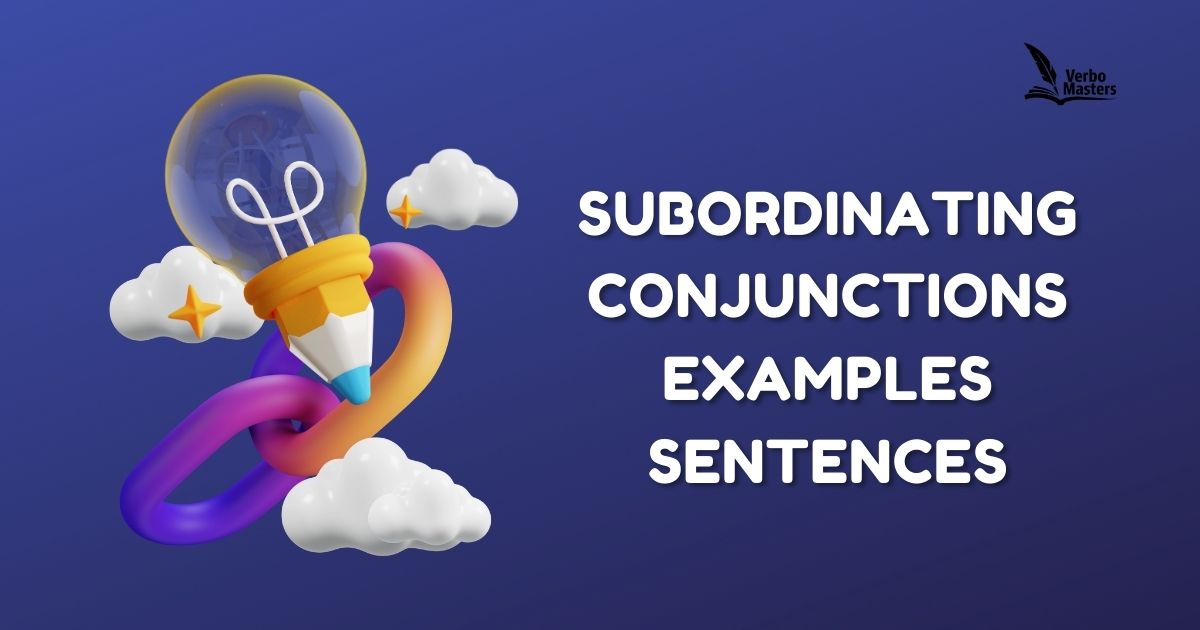Subordinating conjunctions are words that connect dependent clauses to independent clauses, showing a relationship between the two. They help create complex sentences, adding more detail and information. Common subordinating conjunctions include words like “because,” “although,” “if,” “while,” and “since.” By using these conjunctions, we can explain why something happens, when it happens, or under what condition it happens.
For example, “I stayed home because it was raining.” Here, “because” connects the two clauses, giving the reason for staying home. Subordinating conjunctions also help show contrast, time, or conditions, making sentences more interesting. They allow us to explain relationships between ideas, making our writing clearer and more meaningful. In short, subordinating conjunctions are essential tools for crafting more sophisticated and engaging sentences.
You can also read; 150 different ways to say Happy in English
Subordinating Conjunctions and Examples

Subordinating conjunctions are words that link dependent clauses to independent clauses, establishing relationships between them. They are important for creating complex sentences. These conjunctions can show cause, time, contrast, condition, and more. Some common subordinating conjunctions include words like “because,” “if,” “although,” “while,” “since,” and “when.”
These are some examples of sentences with subordinating conjunctions:
- Because it was raining, we decided to stay inside.
- She smiled although she was feeling tired.
- I will go to the park if it stops raining.
- When the bell rings, the class will end.
- He ate his lunch while reading a book.
- We couldn’t go to the beach since the weather was bad.
- If you study hard, you’ll pass the test.
- He was happy because he won the game.
- Although it was late, we went for a walk.
- I’ll call you when I arrive at the airport.
These conjunctions help connect ideas and give more context to the action or event described in the sentence.
FAQ’s
What are subordinating conjunctions?
Subordinating conjunctions are words that link a dependent clause to an independent clause. They show a relationship between the two parts of the sentence, such as cause, time, or condition.
Why are subordinating conjunctions important?
Subordinating conjunctions are important because they allow us to create complex sentences that provide more detail, explain causes or conditions, and make our writing clearer.
Can you give examples of subordinating conjunctions?
Some common subordinating conjunctions include “because,” “although,” “if,” “when,” “since,” “unless,” and “while.”
How do subordinating conjunctions change a sentence?
Subordinating conjunctions help turn a simple sentence into a complex one by adding a dependent clause, which provides additional context or information to the main idea.
What’s the difference between a dependent and independent clause?
An independent clause can stand alone as a sentence, while a dependent clause cannot. The dependent clause relies on the independent clause to form a complete thought.
Can subordinating conjunctions be at the beginning of a sentence?
Yes, subordinating conjunctions can begin a sentence, but when they do, the dependent clause is usually followed by a comma, for example: “Although it was late, we decided to go out.”
How do subordinating conjunctions affect sentence structure?
Subordinating conjunctions affect sentence structure by combining clauses. If the subordinating conjunction comes first, a comma is often used, and if it comes second, no comma is needed.
Can subordinating conjunctions show contrast?
Yes, subordinating conjunctions like “although,” “even though,” and “whereas” are often used to show contrast between two ideas or actions in a sentence.
Are subordinating conjunctions the same as coordinating conjunctions?
No, subordinating conjunctions connect dependent and independent clauses, while coordinating conjunctions connect two independent clauses. Common coordinating conjunctions include “and,” “but,” and “or.”
How can I practice using subordinating conjunctions?
You can practice using subordinating conjunctions by writing sentences that combine two clauses, experimenting with different conjunctions, and paying attention to how they change the meaning or flow of the sentence.
Conclusion
Subordinating conjunctions are essential tools in sentence construction. They help connect a dependent clause to an independent clause, creating more complex and meaningful sentences. These conjunctions provide a way to express relationships between ideas, such as time, cause, condition, or contrast.
By using subordinating conjunctions, writers can make their sentences more detailed and nuanced. For example, “I stayed home because it was raining” gives a reason for the action. Subordinating conjunctions allow us to communicate more effectively by providing additional context or information to the main point.

I’m John Smith, a language enthusiast dedicated to helping writers, students, and professionals master the art of clear and effective communication. Whether you’re looking for grammar tips, writing guides, or common mistake corrections, you’ll find valuable insights to improve your language skills. Let’s make grammar simple and fun!

